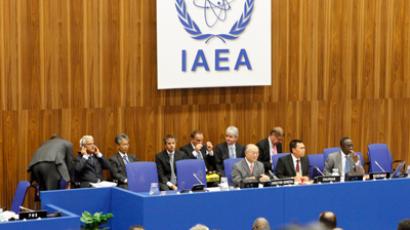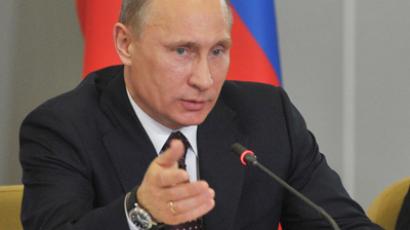US spooks say no Iranian nukes
Iran’s alleged nuclear ambition may be high in the headlines. The US intelligence community, whose job is to assess the threat, is skeptical about it. Same as it has been for five years.
The latest report accusing Iran of trying to make a nuclear weapon came Friday from the UN’s nuclear watchdog IAEA, which reported that Iran has significantly ramped up its uranium enrichment program.However the consensus among US spy agencies remains that Iran had stopped nuclear weapons research years ago, as evidenced by latest statements, reports The New York Times.The agencies believe that Tehran may militarize its nuclear program, but it has not done it. James Clapper Jr., the director of national intelligence and David Petraeus, the CIA director, testified so before Senate on January 31. Other senior US officials, including Defense Secretary Leon Panetta and Gen. Martin Dempsey, the chairman of the Joint Chiefs of Staff, have made similar statements in recent television appearances.US intelligence agencies believed that Iran pursuit nuclear capability up to 2005, but in 2007 they made a u-turn on the issue. That year’s National Intelligence Estimate said that Iran had stopped nuclear weapons research in 2003.The change of heart came as shock to the Bush administration and drew criticism from Israel and some European capitals. Some critics said the CIA and colleagues are too conservative about Iran fearing an embracement similar to that if faced with Iraq.Intelligence reports on Baghdad’s alleged weapons of mass destruction was the key argument for the US invasion of the country, but eventually proved false. In 2006 US spy agencies introduced stricter procedures on analyzing and interpreting intelligence reports to avoid such botches. Critics believe the agencies may have become overly cautious.“They don’t have evidence that Iran has made a decision to build a bomb, and that reflects a real gap in the intelligence,” believes David Kay, who was head of the CIA team sent to search for Iraq’s WMDs after the invasion.It’s true the evidence hasn’t changed very much” since 2007, he added. “But that reflects a lack of access and a lack of intelligence as much as anything.”The surge of tension over Iranian nuclear program started last November, when an IAEA report said circumstantial evidence pointed to Iran’s developing nuclear weapon. The report was criticized for using old facts and presenting them in a way to make case for the allegation rather than providing any new evidence.
Middle East consultant, Peter Eyre, believes that Iran has no intention to go down the road of creating nuclear weapons.“This stand-off with Syria, Iran, and all the rest of the Middle Eastern concerns is basically a geopolitical plan for regime change,” Eyre told RT.Reza Marashi from the National Iranian American Council, a former US State Department officer, told us Iran has not made the decision to build nuclear weapons, but the West should offer positive inducements or it may change its mind.“What the American intelligence agencies…and many other foreign governments’ intelligence agencies are saying is that Iran has not made the political decision to pursue weaponization,” he told RT. “It doesn’t mean that Iranian’s nuclear program isn’t a cause for concern. But it also means that they haven’t made the most troubling decision, and that leaves time for diplomacy to be pursued.”However, “If positive inducements are not offered to Iran…negotiations will fail, because Iran won’t blink,” Marashi resumed.














